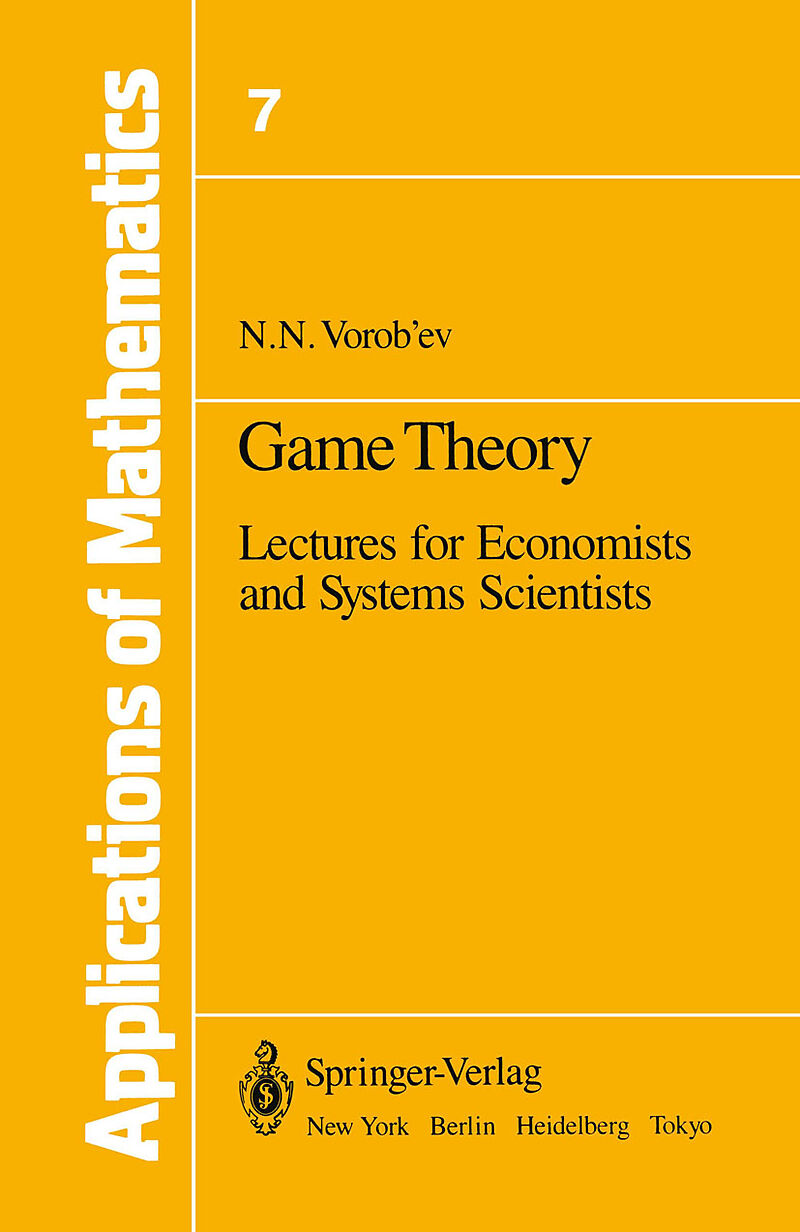Game Theory
Einband:
Fester Einband
EAN:
9780387902388
Untertitel:
Lectures for Economists and Systems Scientists
Genre:
Mathematik
Autor:
Nikolai N. Vorob'ev
Herausgeber:
Springer, Berlin
Auflage:
1977 edition
Anzahl Seiten:
179
Erscheinungsdatum:
1977
ISBN:
978-0-387-90238-8
The basis for this book is a number of lectures given frequently by the author to third year students of the Department of Economics at Leningrad State University who specialize in economical cybernetics. The main purpose of this book is to provide the student with a relatively simple and easy-to-understand manual containing the basic mathematical machinery utilized in the theory of games. Practical examples (including those from the field of economics) serve mainly as an interpretation of the mathematical foundations of this theory rather than as indications of their actual or potential applicability. The present volume is significantly different from other books on the theory of games. The difference is both in the choice of mathematical problems as well as in the nature of the exposition. The realm of the problems is somewhat limited but the author has tried to achieve the greatest possible systematization in his exposition. Whenever possible the author has attempted to provide a game-theoretical argument with the necessary mathematical rigor and reasonable generality. Formal mathematical prerequisites for this book are quite modest. Only the elementary tools of linear algebra and mathematical analysis are used.
Inhalt
1 Matrix games.- 1.1 Definition of a noncooperative game.- 1.2 Admissible situations and the equilibrium situation.- 1.3 Strategic equivalence of games.- 1.4 Antagonistic games.- 1.5 Saddle points.- 1.6 Auxiliary propositions about extrema.- 1.7 Minimax equalities and saddle points.- 1.8 Matrix games.- 1.9 Mixed strategies.- 1.10 A mixed extension of a game.- 1.11 Existence of minimaxes in mixed strategies.- 1.12 Convex sets.- 1.13 The lemma on two alternatives.- 1.14 The minimax theorem.- 1.15 The value of the game and optimal strategies.- 1.16 Three properties of the value of a game.- 1.17 An example: 2×2 games.- 1.18 A graphical solution of 2×n games.- 1.19 A graphical solution of m×2 games.- 1.20 Sufficient criteria for the value of a game and optimal strategies.- 1.21 Domination of strategies.- 1.22 Diagonal games.- 1.23 Sets of optimal strategies in a matrix game.- 1.24 An example: 3×3 games.- 1.25 Symmetric games.- 1.26 Matrix games and linear programming.- 2 Infinite antagonistic games.- 2.1 Introduction and motivation.- 2.2 Situations of ?-equilibrium; ?-saddle points and ?-optimal strategies.- 2.3 ?-optimal strategies and minimaxes.- 2.4 Mixed strategies.- 2.5 Properties of the value of a game and of optimal strategies.- 2.6 The Helly metric.- 2.7 Conditionally compact games.- 2.8 The basic theorem for conditionally compact games.- 2.9 Continuous games on the unit square.- 2.10 Convex functions.- 2.11 Convex games; pure optimal strategies for player II.- 2.12 Convex games; optimal strategies for player I.- 2.13 Strictly convex games.- 2.14 Examples of convex games and their solutions.- 2.15 Market competition.- 2.16 Allocation of production capacities; minimization of the maximal intensity of a production scheme.- 2.17 Allocation of productioncapacities under partial uncertainty.- 3 Noncooperative games.- 3.1 Mixed extensions of noncooperative games.- 3.2 Equilibrium situations.- 3.3 Nash's theorem.- 3.4 Properties of equilibrium situations.- 3.5 Bi-matrix games.- 3.6 Solutions of bi-matrix games.- 3.7 Almost antagonistic games.- 3.8 Prisoner's dilemma.- 3.9 The battle of the sexes.- 3.10 Noncooperative games with two pure strategies for each of the players.- 3.11 False advertising.- 3.12 Preservation of ecology.- 4 Cooperative games.- 4.1 Characteristic functions.- 4.2 Characteristic functions of noncooperative games.- 4.3 Properties of characteristic functions for noncooperative games.- 4.4 Imputations and cooperative games.- 4.5 Essential and inessential games.- 4.6 Strategic equivalence of cooperative games.- 4.7 Zero games.- 4.8 The 0-1 reduced form.- 4.9 Classification of cooperative games with a small number of players.- 4.10 Dominance of imputations.- 4.11 The core of a game.- 4.12 The core of a general three-person game.- 4.13 von Neumann-Morgenstern solutions.- 4.14 vN-M solutions for three person constant sum games.- 4.15 vN-M solutions for general three-person cooperative games.- 4.31 Shapley's vector; axiomatization.- 4.32 Shapley's vector; existence and determination.- 4.33 Examples of Shapley vectors.- Exercises.- Selected bibliography.

Leider konnten wir für diesen Artikel keine Preise ermitteln ...
billigbuch.ch sucht jetzt für Sie die besten Angebote ...
Die aktuellen Verkaufspreise von 6 Onlineshops werden in Realtime abgefragt.
Sie können das gewünschte Produkt anschliessend direkt beim Anbieter Ihrer Wahl bestellen.
Loading...
Die aktuellen Verkaufspreise von 6 Onlineshops werden in Realtime abgefragt.
Sie können das gewünschte Produkt anschliessend direkt beim Anbieter Ihrer Wahl bestellen.
| # | Onlineshop | Preis CHF | Versand CHF | Total CHF | ||
|---|---|---|---|---|---|---|
| 1 | Seller | 0.00 | 0.00 | 0.00 |
